Papers, articles, books by Svetlana Peshkova
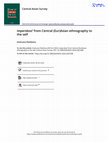
Central Asian Survey , 2024
The Russian word Imperskost', which can be translated into English as 'imperiality', is a useful ... more The Russian word Imperskost', which can be translated into English as 'imperiality', is a useful theoretical concept for scholarly writing in English that addresses individuals' and countries' imperial ambitions. In this note, I explore the meaning and relevance of this concept to our daily lives. Contrary to some existing definitions of Imperskost' in terms of political economy, history, psychology (as an unconscious bias) and its primordial origins, I argue that this feeling is primarily personal and located in the human body. Imperskost' is thus embodied as an emotion articulated and expressed as a sense of privilege, superiority and/ or entitlement. Confronting Imperskost'-whether one is a Russian citizen, a Russian speaker or not-is essential for overcoming it. Since scholarly works, including Central (Eur)Asian ethnography, can be sites for the formation and maintenance of Imperskost', internal disciplinary criticism and reflection are necessary for its undoing. However, this process begins with the individual.
ANTHROPOLOGIES RAN, 2022
Между этнографией/антропологией Центральной (Евр)Азии и колониализмом существуют сложные и на пер... more Между этнографией/антропологией Центральной (Евр)Азии и колониализмом существуют сложные и на первый взгляд парадоксальные связи. Имперские амбиции России и завоевание региона помогли наделили этнографию законным статусом как научную дисциплину. В то же время, описывая различия между людьми и бытом (образом жизни), чувствами и ценностями этих периферийных населений, этнография Центральной (Евр)Азии всегда противоречила, даже если и не намеренно, предположению об универсальности, когда речь шла о европейских, российских или советских ценностях и соответствующих цивилизаторских миссиях.

Central Asian Affairs Journal, 2022
Gender-based violence, (geo)politics, and Islam continue to dominate the production of knowledge ... more Gender-based violence, (geo)politics, and Islam continue to dominate the production of knowledge about Central Asia. While using a gender lens, this Special Issue offers a different perspective on the region. The authors link historical analyses of imperial and Soviet gendered modernities to contemporary Central Asians' daily lives and local nationalisms to shed light on often overlooked areas in the literature, such as a systematic screening out of historical and contemporary gender diversity, sex work, virginity tests, in-bodiment (as in corporeality, not just the performance of social norms,) queer activism, and the use and abuse of discourse on traditions. As a platform for a conversation about negotiating gender in Central Asia and indigenizing gender theory from within other than Euro-American contexts, this Issue is an example of knowledge production by and with Central Asians. This Issue is also an invitation to continue using a gender lens, as there are still several research areas that remain unexplored and would, we believe, benefit from such an approach. central asian affairs 9 (2022) 149-175
Central Asian Affairs , 2022
Current attempts by local national/ist governments to impose a rigid binary gender order on local... more Current attempts by local national/ist governments to impose a rigid binary gender order on local populations are as colonial as the Russian and Soviet colonial attempts to remake Central Asian communities; these efforts are deemed to fail. Bach[ch]a (adolescent feminine male performers), as a gender position and socio-cultural institution not reduced to sexuality, is but one example of such efforts' futility. By adapting to a changing socio-political context, bacha did not disappear; overtime, this institution prevratilos' (has transformed) into something else.
Voices on Central Asia, 2022
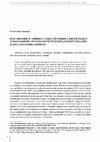
Антропологии/Anthropologies. , 2022
Между этнографией/антропологией Центральной (Евр)Азии и колониализмом существуют сложные и на пер... more Между этнографией/антропологией Центральной (Евр)Азии и колониализмом существуют сложные и на первый взгляд парадоксальные связи. Имперские амбиции России и завоевание региона помогли наделили этнографию законным статусом как научную дисциплину. В то же время, описывая различия между людьми и бытом (образом жизни), чувствами и ценностями этих периферийных населений, этнография Центральной (Евр)Азии всегда противоречила, даже если и не намеренно, предположению об универсальности, когда речь шла о европейских, российских или советских ценностях и соответствующих цивилизаторских миссиях. Хотя такие ученые, как Франсин Хирш (2005), рассматривают роль дисциплины в формировании СССР и проек-те государственного объединения, нам еще предстоит провести критический анализ влияния этнографии/антропологии Центральной (Евр)Азии на создание постколониальных наций и на-ционализма. Изучение отношений между этнографией/антропологией и российским/русским имперским проектом является непростой задачей. Ниже я привожу общий обзор этой пробле-матики и критически рассматриваю связи и отношения между этой дисциплиной и органами власти и контроля. Внутренняя критика этнографии/антропологии необходима, если мы хо-тим, чтобы наши исследования были важны для жителей Центральной (Евр)Азии, а не толь-ко для правителей стран региона и России – правопреемницы СССР. Для пересмотра и пере-осмысления этнографии/антропологии будущего необходимо считаться с ее прошлым. Ниже представлена моя попытка выполнить обе задачи.
СветЛана Пешкова. Кафедра антропологии, Университет Нью-Гэмпшир, Штат Нью-Гэмпшир, США. s.peshkova@unh.edu. https://orcid.org/0000-0002-0067-8829.Для цитирования: Пешкова С., Мое мнение и оценка существующих связей между этнографией/антропологией Центральной (Евр)Азии и (пост)колониализмом // Антропологии/Anthropologies. 2022. No 1. С. 52-67. https://doi.org/10.33876/2782-3423/2022-1/52-67
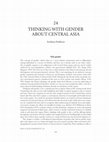
Routledge Handbook of Contemporary CA, 2021
The concept of 'gender,' which refers to a socio-cultural construction used to differentiate amon... more The concept of 'gender,' which refers to a socio-cultural construction used to differentiate among individuals in a society of whether and how one is female, male or any other culturally acceptable category, is not indigenous to the Central Asian region and may not be widely embraced by local populations, scholars and governments (Khalid 2015: 361; Kamp 2009; Megoran 1999).The local use of this term is often limited to the field of international aid and development and non-governmental activism. This is not surprising. As an analytical concept, gender originated and matured in American and European academic and activist circles from the 1960s onward (Olson & Horn-Schott 2018). During the last decade of the twentieth century, international agencies introduced this term to local activists and scholars (Hoare 2016: 292). Despite this history, thinking with gender about local lifeways is not just replicating an analytical concept produced elsewhere. Gender as a lens on social complexity offers a way for a more nuanced understanding of human diversity in and history of the region. Thinking with gender is not a requirement, but an option. Many of the existing works about Central Asia rely only on two, well-established, and widely accepted categories, such as 'women' and 'men.'These two categories are not the only categories present in the Central Asian context historically.They also fail to capture a contemporary diversity of meaningful and liveable human lives in the region. 1 As a result of a persistent scholarly reliance on 'women' and 'men' dichotomy assumed to be universal, humans and collectivities that do not fit neatly within these two categories are considered deviant and/or exceptions often undeserving of scholarly focus and empirical research. Despite the efforts of a handful of scholars (e.g., Buelow 2012;Wilkinson & Kirey 2010; Suyarkulova 2019), academic reliance on this dichotomy continues to create and maintain empirical and theoretical blind spots, which remain as mainly uncharted territory in scholarly work in and about the region. Hence, thinking with gender is also a call for offering thicker descriptions and analyses of local complex and complicated lives by shedding light on these blind spots. One of these spots is gender variance or a range of behaviours associated with opposite sex. This chapter is neither a well-balanced representation of gender roles and/or gender struggles in the region, nor it is a balanced insight into each country's gender orders associated with a (geopolitical) concept of 'post-Soviet' or 'former-Soviet' Central Asia.These imbalances reflect a
Central Asian Survey , 2015
Review of the book
Central Asian Analytical Network, 2017
«Женские марши»: о социальной и политической активности женщин в Центральной Азии в интервью со С... more «Женские марши»: о социальной и политической активности женщин в Центральной Азии в интервью со Светланой Пешковой (English)
Central Asian Analytical Network, 2017
«Женские марши»: о социальной и политической активности женщин в Центральной Азии в интервью со С... more «Женские марши»: о социальной и политической активности женщин в Центральной Азии в интервью со Светланой Пешковой (Russian)
Journal of Feminist Studies in Religion, 2015
Muslim women’s leadership cannot be reduced to its social manifestations and formation. While ana... more Muslim women’s leadership cannot be reduced to its social manifestations and formation. While analyzing a case study of leadership provided by some Muslim women in Uzbekistan, a post-Soviet Central Asian country, the author demonstrates that this
leadership is essentially personal, propelled from within individuals and driven by their motivations. At the same time, Muslim
women’s leadership is relational—conceptualized and enacted
always in relation to someone or something, including the self.
By highlighting the importance of individual experiences, this
article highlights the personal-relational dynamic and calls for an
analytical reassessment of the role of the human body beyond its
expected use in cultivating certain dispositions and sensibilities
in the debates about Muslim women’s leadership.
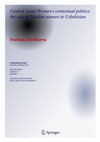
Contemporary Islam Journal, 2020
Working toward theorizing Central Asian women’s variegated and dynamic socio-political activism, ... more Working toward theorizing Central Asian women’s variegated and dynamic socio-political activism, in this article, I argue that the contextual nature of their activism remains the only viable analytical generalization we can make at this time. This activism emerges always in a particular existential and relational context presenting a range of problems local activists aim to address through the means available to them, including discourses on Islam, gender, and justice. I exemplify my approach by focusing on several Muslim women activists at different levels of Uzbek society, including an individual, communal, and a societal ones. Inspired by their interpretations of Islamic duties and responsibilities, these women fostered their individual moral transformation simultaneously extending it beyond themselves toward their local communities and the government.
In Women of Asia: Globalization, Development, and Social Change. Edited by Linda Lindsey and Mehrangiz Najafizadeh, Routledge (Taylor & Francis Group). Chapter 27. Pp. 365-378. , 2018
In Uzbekistan Beyond the ‘Curtain.’ Approaches, Fieldworks, and Topics. Edited by Marlene Laurelle & Timur Dadabaev. Lexington/Rowman and Littlefield. Pp. , 2017
Islam, Society, and Politics in Central Asia. Edited by Pauline Jones Luong. University of Pittsburg Press. Pp. 29-55. , 2017
Uzbekistan Forum, Central Asian Survey, Special Issue, 2016, 2016
In Uzbekistan Forum, Central Asian Survey, Special Issue, 2016
This article examines Chechens' desire for freedom. 2002








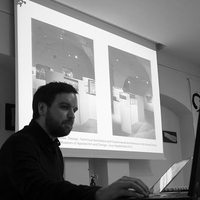

Uploads
Papers, articles, books by Svetlana Peshkova
СветЛана Пешкова. Кафедра антропологии, Университет Нью-Гэмпшир, Штат Нью-Гэмпшир, США. s.peshkova@unh.edu. https://orcid.org/0000-0002-0067-8829.Для цитирования: Пешкова С., Мое мнение и оценка существующих связей между этнографией/антропологией Центральной (Евр)Азии и (пост)колониализмом // Антропологии/Anthropologies. 2022. No 1. С. 52-67. https://doi.org/10.33876/2782-3423/2022-1/52-67
leadership is essentially personal, propelled from within individuals and driven by their motivations. At the same time, Muslim
women’s leadership is relational—conceptualized and enacted
always in relation to someone or something, including the self.
By highlighting the importance of individual experiences, this
article highlights the personal-relational dynamic and calls for an
analytical reassessment of the role of the human body beyond its
expected use in cultivating certain dispositions and sensibilities
in the debates about Muslim women’s leadership.
СветЛана Пешкова. Кафедра антропологии, Университет Нью-Гэмпшир, Штат Нью-Гэмпшир, США. s.peshkova@unh.edu. https://orcid.org/0000-0002-0067-8829.Для цитирования: Пешкова С., Мое мнение и оценка существующих связей между этнографией/антропологией Центральной (Евр)Азии и (пост)колониализмом // Антропологии/Anthropologies. 2022. No 1. С. 52-67. https://doi.org/10.33876/2782-3423/2022-1/52-67
leadership is essentially personal, propelled from within individuals and driven by their motivations. At the same time, Muslim
women’s leadership is relational—conceptualized and enacted
always in relation to someone or something, including the self.
By highlighting the importance of individual experiences, this
article highlights the personal-relational dynamic and calls for an
analytical reassessment of the role of the human body beyond its
expected use in cultivating certain dispositions and sensibilities
in the debates about Muslim women’s leadership.